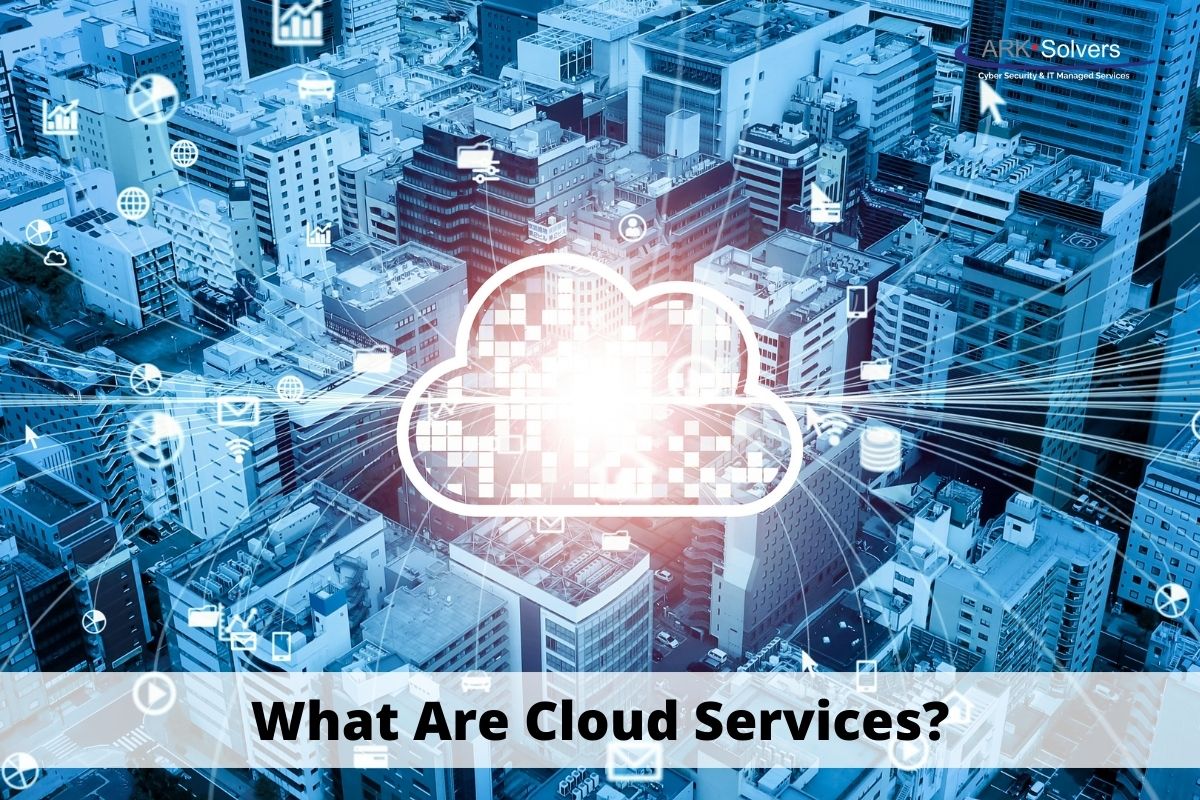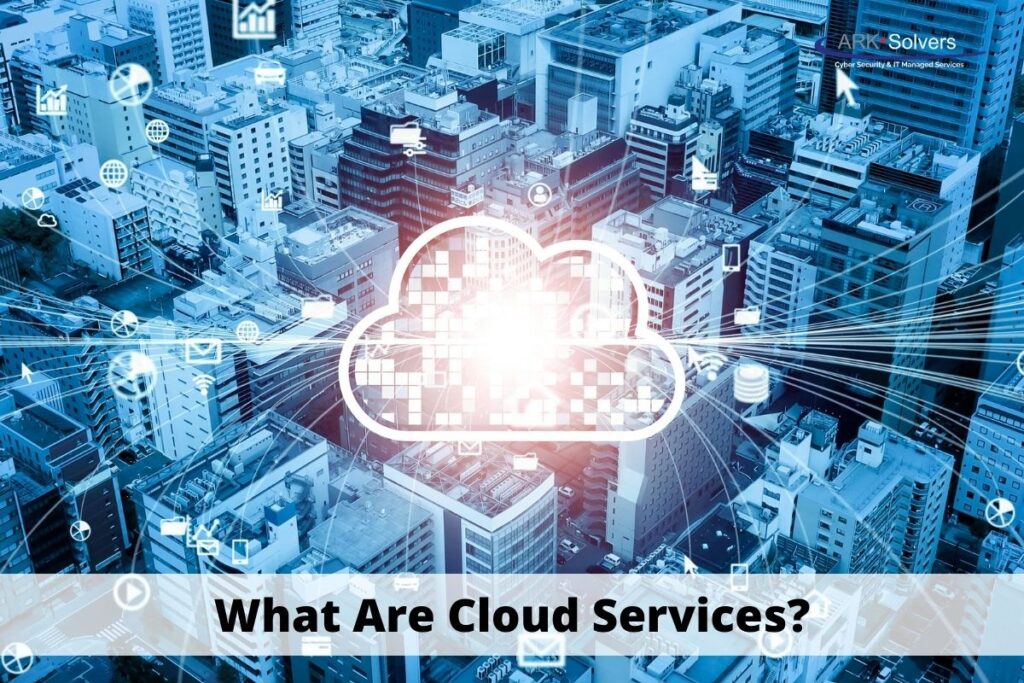What Are Cloud Services?

What Are Cloud Services?
Cloud services have changed the game in technology, making it easier for businesses and people to use computing resources. Ark Solvers, a top tech solutions provider, is here to explain this new concept. They will show you the vast possibilities of cloud services.
So, what are cloud services, and how are they different from old computing ways? Cloud services are many computing tools and technologies available online. They let users access software, platforms, and storage whenever needed without handling the hardware or IT stuff. This new way has opened up many opportunities for businesses to work better, be more efficient, and innovate.
As you explore cloud services, you might wonder: What are the benefits of using cloud-based solutions, and how can they change your business or personal life? Ark Solvers will help you understand cloud computing. They will discuss the good things, the different service models, and what to consider when choosing your tech investments.
Key Takeaways
- Cloud services offer on-demand access to computing resources and technologies delivered online.
- They enable businesses and individuals to leverage software, platforms, infrastructure, and storage without managing the underlying IT infrastructure.
- Cloud services provide increased flexibility, scalability, and cost-effectiveness, transforming organizations’ operations.
- Understanding the different cloud service models, such as SaaS, PaaS, and IaaS, is crucial for identifying the right solutions for your needs.
- Exploring the potential benefits of cloud services, including cost savings, improved productivity, and enhanced collaboration, can help you make informed decisions about your technology investments.

Introduction to Cloud Services
The cloud has changed how we use computers. Ark Solvers helps you understand cloud services. They show how cloud computing works and its many benefits.
Read More: What is Cloud Computing? Types, Examples, and Benefits
Understanding the Basics of Cloud Computing
Cloud computing means using the Internet for computing needs. You don’t need your servers or devices. Instead, you can use cloud resources from anywhere.
This change has made managing data and apps more accessible. There has been a significant shift from old methods to new cloud-based methods.
The Benefits of Adopting Cloud Solutions
Ark Solvers’ cloud services bring many benefits. You save money with pay-as-you-go pricing. Resources grow with your needs, and work gets done faster.
Clouds also keep your data safe. They offer great backup and recovery options. This means your critical information is secure.
Ark Solvers helps you with cloud hosting, serverless computing, and more. They aim to help you use cloud services to their fullest.
Read More: Discover the Key Benefits of Cloud Computing Today
What Are Cloud Services?
At Ark Solvers, we think it’s crucial to know about cloud services. Cloud services are computing services delivered over the Internet. They’re not stored on a local server or personal computer.
These services can do many things, like store and process data, run applications, and more. The great thing about cloud services is how flexible, scalable, and easy to access they are. Users can use these resources when needed without needing a lot of infrastructure or IT help.
When we talk about cloud services, we usually mean three main types: software-as-a-service (SaaS), platform-as-a-service (PaaS), and infrastructure-as-a-service (IaaS). Each type has its benefits and meets different needs.
- Software-as-a-Service (SaaS): SaaS lets users access web-based applications and software without installing or maintaining it locally. Examples include cloud-based productivity suites, CRM tools, and project management platforms.
- Platform-as-a-Service (PaaS): PaaS gives a complete platform for developing, testing, and deploying applications. It handles the underlying infrastructure so developers can focus on their work.
- Infrastructure-as-a-Service (IaaS): IaaS provides virtualized computing resources like storage, networking, and processing power on demand. It lets organizations scale their infrastructure without a large upfront cost.
By understanding the different cloud services and what they can do, businesses can pick the best solutions for their needs, helping them move forward in their digital transformation journey.
Types of Cloud Services
The world of cloud computing has many service models, each meeting different business needs. At Ark Solvers, we think it’s key to know the differences, which helps make better choices. Let’s look at the main types: software as a service (SaaS), platform as a service (PaaS), and infrastructure as a service (IaaS).
Read More: Types of Cloud Computing – SaaS vs PaaS vs IaaS
Software as a Service (SaaS)
SaaS lets users access applications over the Internet. These apps are hosted and managed by a provider. Businesses use SaaS to manage customer relationships and productivity tools. Top SaaS providers include Salesforce, Microsoft Office 365, and Google Workspace.
Platform as a Service (PaaS)
PaaS provides developers with a complete environment for building and deploying apps. It hides the underlying tech so developers can focus on their work. Popular PaaS providers are Amazon Web Services (AWS) Elastic Beanstalk, Google App Engine, and Microsoft Azure.
Infrastructure as a Service (IaaS)
IaaS provides on-demand access to computing resources like servers and storage. It allows businesses to quickly adjust their infrastructure as needs change. The Top IaaS providers are Amazon Web Services (AWS), Microsoft Azure, and Google Cloud Platform.
Businesses need to understand each cloud service model. This helps them pick the right one for their needs. At Ark Solvers, we help our clients navigate cloud services and aim to help them use cloud computing to the fullest.
Cloud Service Deployment Models
Businesses have many cloud service options. At Ark Solvers, we help our clients choose the best cloud solution for them.
The public cloud is a shared space managed by a third party. It’s cost-effective and scalable for many companies. In contrast, the private cloud is just for one business. It offers more control and customization.
The hybrid cloud is a mix of public and private clouds. It lets businesses take advantage of the public cloud’s flexibility and cost while maintaining the private cloud’s security and control.
The multi-cloud strategy uses services from different providers. It gives businesses more redundancy, flexibility, and the chance to optimize services for specific needs.
At Ark Solvers, we help our clients find the right cloud model and ensure they can use cloud computing to grow their businesses.
Cloud Service Providers
In the fast-changing world of cloud computing, a few companies stand out. They offer many cloud-based solutions for businesses and individuals. Companies like Amazon Web Services (AWS), Microsoft Azure, and Google Cloud Platform lead the way.
Exploring the Major Players in the Market
Ark Solvers has studied the cloud service provider market deeply. They’ve highlighted the leading players and what they offer:
- Amazon Web Services (AWS) is the top name in cloud services. It offers everything from computing and storage to AI and machine learning.
- Microsoft Azure: Microsoft Azure is a strong competitor. It uses its knowledge of enterprise software to offer a solid platform for cloud apps and infrastructure.
- Google Cloud Platform: Google Cloud Platform is known for its advanced technology and data analytics. It’s a big player in AI and machine learning.
- IBM Cloud: IBM’s long history in tech has helped it become a significant player in the cloud. It focuses on hybrid cloud solutions and specific industry offerings.
- Salesforce: Salesforce is a leader in the SaaS model. It offers a range of cloud-based CRM and collaboration tools.
- Oracle Cloud: Oracle’s experience in enterprise software has given it a robust cloud platform. It’s excellent for large organizations, especially in database management and ERP.
Knowing about these top cloud service providers is key for businesses. It helps them make smart choices about their cloud strategy.
Cloud Security and Compliance
More businesses are using cloud services for their computing needs, making cloud security and compliance very important. At Ark Solvers, we focus on protecting sensitive data and meeting regulatory needs.
Addressing Data Protection and Privacy Concerns
Data protection and privacy are keys in the cloud. Cloud providers like Ark Solvers use strong security to keep data safe. We use advanced encryption and strict access controls to protect your data.
Ark Solvers also follows necessary regulations like HIPAA, PCI-DSS, and GDPR. We work with our clients to meet their specific needs. Our security experts help ensure your data is safe, and your operations follow the rules.
Our approach is based on the shared responsibility model. Ark Solvers and our clients work together for cloud security and compliance. We provide the tools and infrastructure while you manage your data and access. This way, we cover all aspects of cloud security and compliance together.
Read More: What is Cloud Security?
Cloud Migration Strategies
Organizations are moving to the cloud to take advantage of its benefits. Ark Solvers, a top cloud solutions provider, helps businesses migrate smoothly and offers various strategies for a seamless cloud migration journey.
The “lift-and-shift” method is standard. It moves apps and infrastructure to the cloud with little change. This method is quick and cost-effective for starting with cloud adoption. But, for more profound optimization, “refactoring” might be better.
Refactoring means changing apps to use cloud features like scalability and microservices. It unlocks cloud computing’s full potential but needs more time and resources.
Another strategy is building new apps for the cloud. This uses cloud-native tech and best practices and ensures apps work well in the cloud from the start.
Ark Solvers stresses the need for a good cloud migration plan. This includes checking the current IT, choosing the right cloud providers, and making a detailed migration plan. The plan should cover data migration, app compatibility, and user training.
Working with Ark Solvers helps businesses tackle cloud migration. To fully benefit from the cloud, they can use lift-and-shift, refactoring, or cloud-native development.
Cloud Services Examples
The world of cloud services is vast and constantly changing. It has many real-world uses across different industries. From small startups to big companies, businesses use cloud solutions to make things better. They use it to work more efficiently, be more productive, and innovate.
Retail and E-commerce
Ark Solvers, a top online store, uses cloud services to manage inventory and customer relationships. They have a large product catalog and want to give customers a great experience. Cloud applications help them grow their business during busy times and keep orders flowing smoothly.
Healthcare and Telemedicine
Cloud services are key in healthcare for storing medical records and for telemedicine. Ark Medical, a big healthcare provider, uses cloud services to keep patient data safe. They also use them for remote doctor visits and to improve teamwork.
Education and Remote Learning
The COVID-19 pandemic made cloud services more critical in education. Ark Academy, a forward-thinking school, uses cloud services for online learning. They have tools for video calls and cloud storage. This helps students and teachers work together and access learning materials easily.
These examples show how cloud services are changing many industries. As technology improves, cloud computing will have even more uses. It will help businesses work better, be more productive, and innovate.
Read More: Public Cloud vs Private Cloud vs Hybrid Cloud
Benefits of Cloud Services
Ark Solvers’ cloud services bring many benefits to businesses and individuals. One significant advantage is saving money. The pay-as-you-go pricing lets you scale up or down as needed. This way, you avoid the high costs of traditional setups.
Cost Savings and Scalability
Cloud services are also super scalable. Ark Solvers’ solutions help you quickly adjust to new needs. You can grow or shrink your resources as you go. This flexibility, virtualization, and multi-tenancy means you only pay for what you use. This leads to significant savings over time.
Read More: What is the Average Cost of Cloud Service?
Increased Productivity and Collaboration
Ark Solvers’ cloud services also make teams more productive and collaborative. They offer remote access to data and apps, allowing employees to work from anywhere and smoothing teamwork and communication.
The cloud’s centralized storage and real-time file sharing help teams work better together, leading to better productivity and business results.
FAQ
What are cloud services?
Cloud services are computing resources over the Internet. They let businesses and people use software and storage without managing hardware. This is done on-demand, without the hassle of IT setup.
What are the different types of cloud services?
There are three primary cloud services: Software as a Service (SaaS), which gives access to Internet software like email and CRM tools; Platform as a Service (PaaS), which helps developers build and manage apps without the IT hassle; and Infrastructure as a Service (IaaS), which offers computing resources like virtual machines and storage, scaling as needed.
What are the benefits of adopting cloud solutions?
Cloud services bring many benefits: – Cost savings: You only pay for what you use, saving money. – Scalability: Clouds grow or shrink with your needs, offering flexible resources. – Increased productivity: Cloud apps and tools boost efficiency and support remote work. – Improved data security: Cloud providers have robust security measures to protect your data.
What are the different cloud deployment models?
Clouds come in different models: – Public cloud: Shared by many, owned by a third party. – Private cloud: Dedicated to one organization, managed internally or by a third party. – Hybrid cloud: Combines public and private clouds for the best of both. – Multi-cloud: Uses multiple providers to meet various needs.
Who are the major cloud service providers?
Top cloud providers include: – Amazon Web Services (AWS) – Microsoft Azure – Google Cloud Platform – IBM Cloud- Salesforce- and Oracle Cloud.
How can I ensure the security and compliance of my cloud-based data?
To keep your data safe, use robust security controls and follow industry standards. This includes encryption, access management, and regular security checks.
What are the critical strategies for migrating to the cloud?
Key migration strategies are:
- Lift-and-shift, Which Moves apps to the cloud with little change.
- Refactoring, Which Modifies apps to use cloud-native features.
- Cloud-native development, which builds apps for the cloud from scratch.
What are some examples of cloud services being used in different industries?
Cloud services are used in many fields: Retail uses cloud-based e-commerce and CRM tools. Healthcare employs cloud-based EMR systems and telehealth. Finance adopts cloud accounting and regulatory solutions. Manufacturing uses cloud ERP systems and IoT platforms.
What are the key benefits of cloud services in terms of cost savings and scalability?
Cloud services offer cost savings and scalability: – Cost savings: Pay only for what you use, reducing costs. – Scalability: Clouds adjust to your needs, providing flexible resources.
How can cloud services improve productivity and collaboration?
Cloud services boost productivity and teamwork: – Anytime, anywhere access: Work from anywhere with cloud apps. – Improved data sharing: Cloud platforms enable real-time collaboration. – Automated updates and backups: Clouds handle maintenance, freeing up IT resources.


